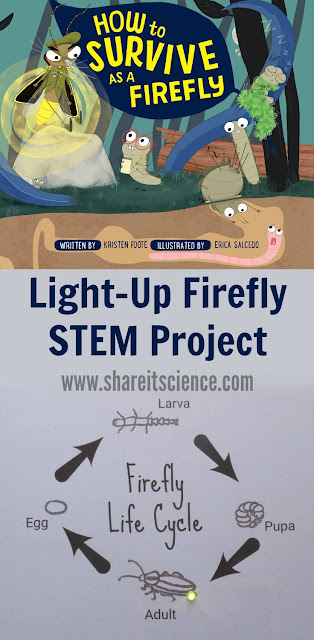If you are a teacher or a parent, there is bound to be something in here that keeps your children or students engaged and gets them excited about fireflies. Read on to find out about all the activities listed above, including how you can align them with the Next Generation Science Standards (NGSS).
This post contains affiliate links, please see disclosures for more information.
How to Survive as a Firefly
If you love kid's books that are not only fictional and funny, but also scientifically accurate, How to Survive as a Firefly by Kristen Foote, illustrated by Erica Salcedo, is definitely for you.
A group of eager firefly larva learn the ins and outs of their own life cycle from an adult firefly drill sargent. The humorous book outlines the life cycle of Photinus pyralis, the most common firefly in North America.
Woven throughout the silly story are serious biology vocabulary words such as bioluminescence and aggressive mimicry. Despite the great number of syllables in these words they are made completely understandable in the text. Fun firefly facts are found on many pages as well. An upper elementary science class, or STEM loving kids at home will get a big kick out of this book.
Here is a sneak peek:
If How to Survive as a Firefly sounds good to you, you'll also want to read the other, equally enjoyable book in this series, How to Survive as a Shark.
A Firefly Interdisciplinary Language Arts and Science Activity
Once you've read How to Survive as a Firefly, give your kids or students this fun writing prompt:
"Imagine you are an adult firefly who must describe the life cycle of fireflies to your nervous cousin who has just emerged from an egg."
Use this free How to Survive as a Firefly-themed printable writing sheet and blank comic strip to write and illustrate the description of a firefly's life cycle.
Communicate Like a Firefly Light-Up STEM Project
Adult fire flies, blink in various patterns with their bioluminescent abdomens (depending on species, temperature, etc.) to communicate with each other. This helps fireflies attract mates. Scientists study these patterns to learn more about fireflies.
You can learn these patterns or make up your own firefly language too! Use this free printable life cycle sheet to start your light-up firefly project.
You will need these supplies:
**PLEASE NOTE: Lithium coin cell batteries can be harmful and even fatal if swallowed. Please take care that they are out of reach of small children.
Step 1:
Poke a hole with the prongs of one LED light bulb through the life cycle sheet on the adult firefly's abdomen.
Step 2:
Flip the paper over. Peel off a piece of copper tape and add it horizontally just above the prongs of the LED (see image below). Make a sharp corner, either by folding (see tips here) or by using another piece of copper tape. The tape should stop about an inch above the bottom edge of the paper.
[Please note: if your copper tape is not conductive on both sides, you must fold the corners, because placing one piece on top of another will break the circuit. The type I purchased and have used here is conductive on both sides, so you can layer on top with no problem.]
Step 3:
Add a longer piece of copper tape horizontally just under the prongs of the LED. Again, make a turn or add another piece vertically below it. Make another corner, or add another piece so that the copper tape follows along the bottom edge of the paper right to the horizontal edge. Be sure there is a gap between the bottom of the first copper tape strip and this one.
Step 4:
Test out your circuit before you tape anything down. Fold the prongs of the LED down so that one is touching one strip of copper tape, and the other touching the second strip of copper tape. Place the coin cell battery on the bottom of the first strip of copper tape.
You might need a second set of hands to help hold things down while you then fold up the bottom edge so that the copper tape makes a connection with the top of the battery. If the LED does not light, try adjusting where the copper tape is touching the battery. If it still will not light, rotate the light so that the prongs are making contact with the opposite strips of tape. The LED will only work in one direction.
Step 5:
Once you've determined whether your battery and light bulb are in the correct position, and you've gotten it to light up, tape down the prongs of the LED and the battery. Be sure you aren't covering up the battery where it needs to make contact with the copper tape.Step 6: Completion!
Now you can use your paper circuit firefly to blink and communicate with your classmates. Close the circuit by pinching the paper around the battery.
Kids can practice "talking" by blinking with this interactive from the American Museum of Natural History or learn more about their patterns with this Science Friday resource. These are a bit technical, but as long as kids understand that each species of firefly makes its own signal and pattern, then they can begin to create their own messages.
Have you ever tried calling a firefly? I've done it while leading families on a night hike. It is pretty magical. Learn more about how you can do this with only a flashlight by following this family friendly link, or this slightly more technical one. (If you are an outdoor educator, the latter link is a must-read!)
If you enjoyed making a light-up paper circuit, you can use the same materials to create your own light-up board games!
Links to the Next Generation Science Standards (NGSS)
You can use this lesson to work toward meeting the NGSS.
The following 1st Grade-4th Grade standards apply, if you are studying:
- Life Cycles 3-LS1-1
- Diversity of Life in Different Habitats 2-LS4-1
- Adaptations 3-LS4-2, 4-LS1-1
- How Animals Receive Information 4-LS1-2
- Using Light to Communicate 1-PS4-4
For another great book and NGSS linked science activity check out this Zoey and Sassafras Insect Investigation.
Buy a Book and Help a Good Cause
You may not be aware of this, but when you purchase a book published by The Innovation Press, like How to Survive as a Firefly, you are not only getting a great book for the children in your life, but also helping others. For every 10 books sold, The Innovation Press donates one book to First Book, getting books into the hands of kids and schools in need.













 Surviving Like a Shark Energy Transfer Game
Surviving Like a Shark Energy Transfer Game Thanksgiving Dinner Trophic Pyramid Activity
Thanksgiving Dinner Trophic Pyramid Activity Integrating Technology in the Life Sciences
Integrating Technology in the Life Sciences "Flight of the Pollinators" a Picture-Perfect Science Lesson
"Flight of the Pollinators" a Picture-Perfect Science Lesson Celebrate Darwin Day!
Celebrate Darwin Day!
No comments:
Post a Comment